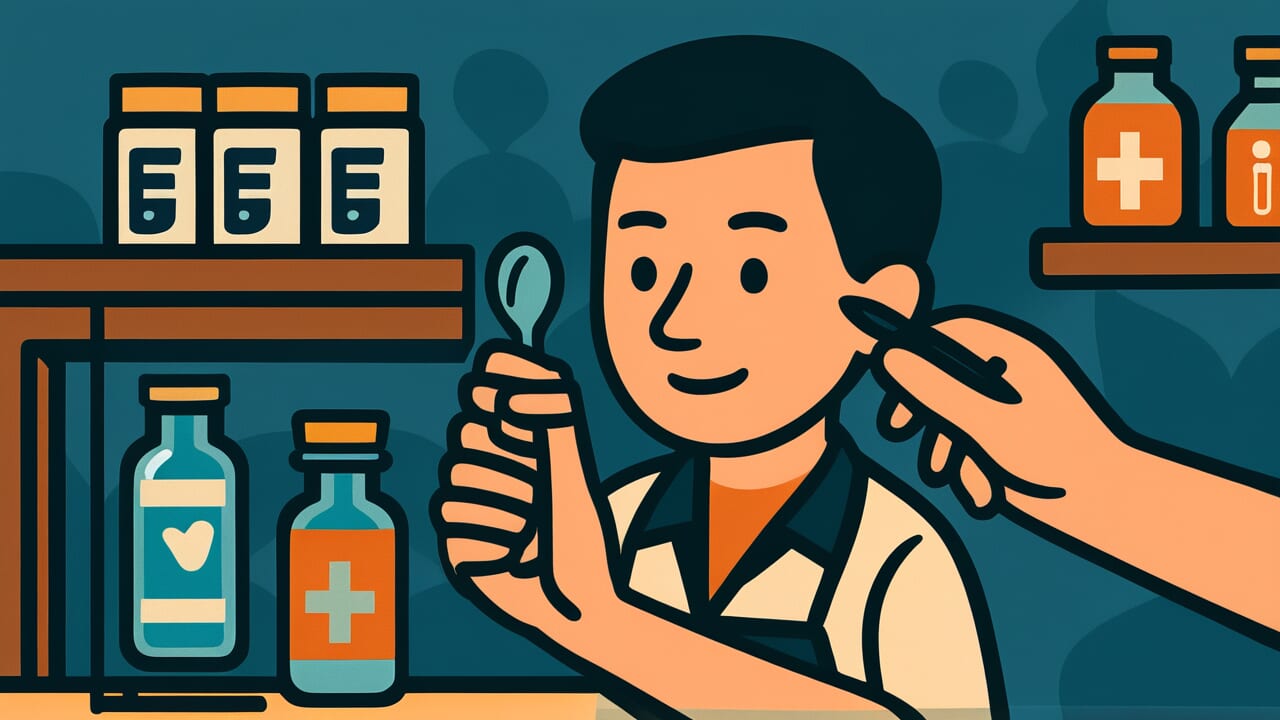How to Read “Even a doctor’s medicine depends on the spoon’s measure”
Isha no kusuri mo saji kagen
Meaning of “Even a doctor’s medicine depends on the spoon’s measure”
This proverb means that experts must carefully judge the right amount or method for each situation. Just as doctors adjust medicine doses for each patient, every field requires appropriate adjustments based on circumstances.
People use this saying when experts must decide how to apply their skills. For example, teachers balancing strictness and kindness with students. Or chefs adjusting seasoning amounts. Or managers setting performance standards for employees.
This expression matters because greater expertise means greater impact. Wrong adjustments can backfire, even with good intentions. Today, people understand it as showing the flexibility and responsibility experts must have when making judgments.
Origin and Etymology
No one knows exactly when this proverb first appeared in writing. However, people likely used it during the Edo period. Medical treatment centered on herbal medicine then, and preparing medicines was a doctor’s important work.
The word “saji kagen” (spoon’s measure) is interesting. A spoon was a small tool for measuring medicine. Doctors adjusted the amount based on each patient. The right dose varied by age, body size, and constitution. Too much became poison. Too little had no effect.
Doctors used years of experience and knowledge to judge this delicate balance.
This expression probably came from the importance of skill and experience in medicine. People in the Edo period saw how skilled doctors made judgments that couldn’t be written in manuals. The careful way doctors handled life-and-death medicines left a strong impression. Their ability to respond flexibly to each situation stood out.
Over time, this expression spread beyond medicine. It became a proverb about the importance of judging the right degree in any expert’s work.
Interesting Facts
Medicine spoons used by Edo period doctors were often made of silver. Silver changes color when it touches poison, so it helped confirm medicine safety. Even a simple tool contained wisdom for protecting patients’ lives.
In herbal medicine, the same ingredient can have different effects depending on brewing time and heat level. Not just the spoon’s measure, but the fire’s control mattered too. A doctor’s skill covered the entire medicine-making process.
Usage Examples
- He’s an excellent lawyer, but his advice to clients follows “even a doctor’s medicine depends on the spoon’s measure”—sometimes strict, sometimes encouraging
- As project leader, I remember that instructions to members are like “even a doctor’s medicine depends on the spoon’s measure”
Universal Wisdom
This proverb has lasted because it addresses the eternal theme of “how to use power” in human society.
Having expertise or authority means having power to greatly influence others. But when humans gain power, they face the difficulty of controlling it properly. Actions from good intentions hurt others. Judgments believed correct make situations worse.
Haven’t we all had such experiences?
This proverb reveals a truth: real expertise lies not just in knowledge or skills, but in the judgment of how to use them. Just as doctors adjust medicine amounts for each patient, human relationships, education, and work all require sensitivity to read people and situations.
Interestingly, this proverb shatters the illusion that “experts are perfect.” Rather, it teaches that experts should constantly question their judgments and stay careful. This strikes at the essence of human humility.
No matter how much knowledge or experience you gain, situations constantly change and each person differs. That’s why continuing to learn and think matters so much.
When AI Hears This
When someone takes medicine, the human body doesn’t simply show “proportionally increasing effects.” From a control engineering perspective, the human body is an extremely troublesome nonlinear system.
For example, when you increase a medicine by one milligram, the body barely responds in low concentration ranges. But the moment it crosses a threshold, effects appear suddenly. Increase it further, and side effects grow exponentially. This is exactly what engineering calls “gain nonlinearity.”
What makes it more complex is that the body’s gain changes with time of day, meals, and stress levels—even in the same person. The optimal morning dose becomes excessive at night. In other words, doctors face a “time-varying system.”
In control engineering, continuously inputting fixed values into such systems always causes control failure. That’s why skilled doctors unconsciously perform “adaptive control,” fine-tuning doses while observing patient responses.
What’s fascinating is how narrow the optimal dose range is. The “therapeutic index” showing the ratio between therapeutic and toxic ranges is often around 2. In other words, twice the proper amount enters the danger zone.
This is what control engineering calls “a system with small stability margins.” Slight adjustment errors become fatal. That’s why the delicate technique of spoon’s measure determines life and death.
Lessons for Today
This proverb teaches you that “being right” alone isn’t enough. As you gain knowledge and experience in any field, how you use them becomes more important.
For example, when guiding junior colleagues at work, just pushing correct arguments doesn’t always help them grow. You read their personality, their condition that day, and their situation, then choose your words. That’s the “spoon’s measure.”
Parenting works the same way. Judging when to be strict and when to watch over isn’t written in manuals.
Modern society tends to seek efficiency and correct answers. But in situations involving people, this subtle adjustment is the most important skill. Your knowledge and power can become medicine or poison depending on how you use them.
That’s why you must always stand in others’ positions and calmly observe situations.
Develop expertise while also refining the wisdom to use it properly. Only with both wheels can you truly become someone who helps others.



Comments